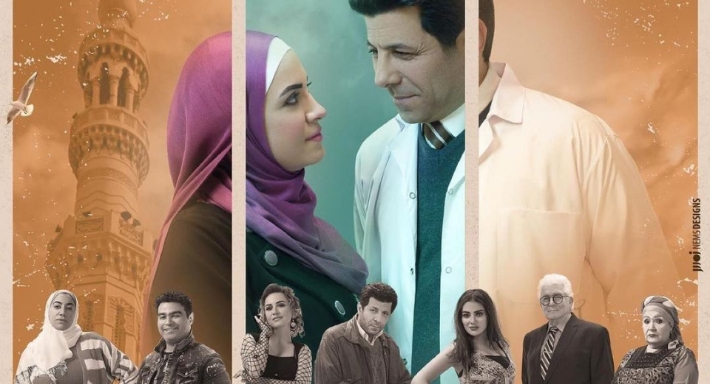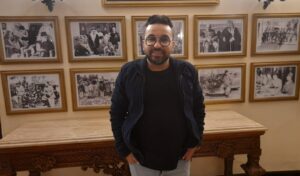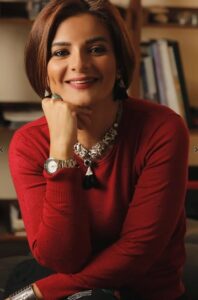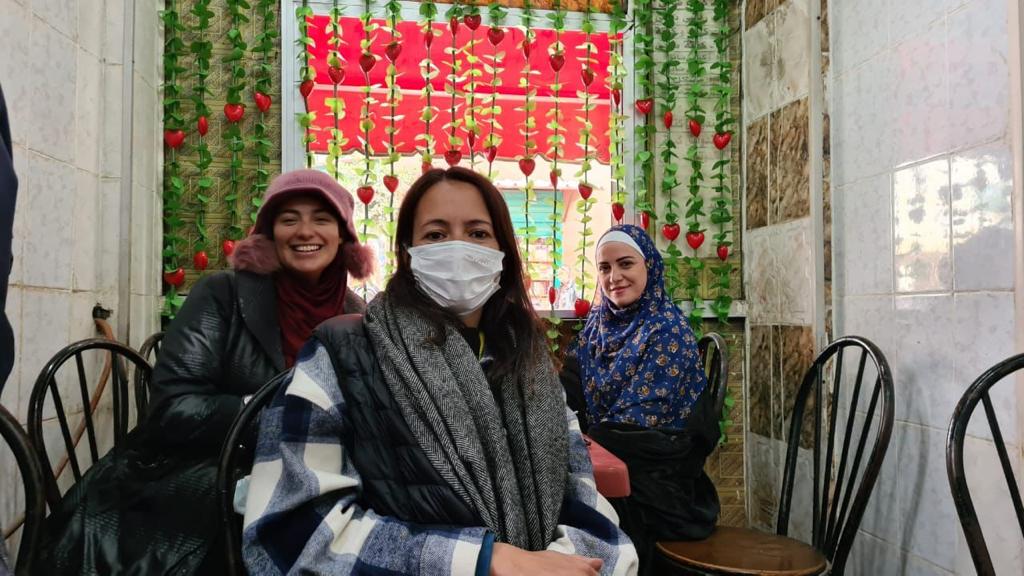Film Review by Khalid Ali, Film and Media Correspondent
‘Face and Back’ (Weish wa Dhahr) TV mini-series (directed by Mariam Abou Ouf, Egypt, 2022) available on https://shahid.mbc.net/ar (Arabic with English subtitles)
The health of any society is strongly influenced by the socioeconomic status, and cultural, and spiritual beliefs of its population. These factors inform the attitudes and behaviours of individuals towards health and healthcare providers. Before I recount the plot of the thought-provoking ‘Face and Back’, I would like to introduce the reader to the colourful cosmos of its setting, Tanta. Located between Cairo and Alexandria, Tanta city accommodates a fifth of Egypt’s population. Tanta is notable for being the home of Ahmad Al-Badawi Mosque named after the revered 13th century Sufi scholar. In October every year, an eight-day religious festival (Moulid) celebrates the birth of Ahmad al-Badawi, an occasion that attracts thousands of followers from all over Egypt.[1]

Now back to the TV series, Gamal (Eyad Nassar), a middle-aged civil servant in a pharmaceutical company, is marginalised by everyone including his wife Maysaa (Fadwa Abed). When he accidentally becomes the owner of a case full of money, he escapes his worthless life, and travels to Tanta to start a new life financed by the loot. Through a series of flashbacks, the viewer is introduced to Gamal’s past: as a child, he wanted to study medicine; a dream that was shattered when he was unfairly disqualified for cheating at a secondary school exam. As a teenager, Gamal worked as a healthcare assistant in a clinic with the kind Dr Galal Farahat (Mahmoud Qabeil). In that clinic, Gamal learnt the tricks of the medicine trade, and continued his self-education by reading medical textbooks. Back in Tanta as a fugitive, Gamal makes a spot diagnosis of a diabetic emergency in a young child. Saving the child’s life becomes a trigger for Gamal to assume a fake identity as a ‘doctor’. Emboldened by the warm reception and gratitude of satisfied customers/ patients, Gamal opens a community clinic practising as a fully qualified doctor. Good word of mouth establishes his credibility as a ‘humane doctor’. Another twist of events introduces Duha (Riham Abdel Ghafour), a belly-dancer in local wedding parties, who masquerades as a ‘nurse’ in Gamal’s clinic. Duha is trying to make ends meet as the sole bread winner for her family. The doctor and nurse continue their deception towards each other and trusting patients.

While fundamentally Gamal is a charlatan, he still manages to show several qualities of a good doctor: humane care and empathy, acknowledging patients’ poverty by charging minimal fees, seeking a second opinion for a case of ‘narcolepsy’, and always adopting a non-judgemental approach. The reason why he gets away with façade and pretence is partially due to the prevalent cultural beliefs of accepting illness as ‘fate’, and anyone offering a glimmer of hope is welcomed without questioning. These grateful patients are not seeking cure most of the time; they would be satisfied with some amelioration of their symptoms. Even Gamal’s catastrophic mistake when a patient dies in clinic is covered up when the patient’s family vehemently refuses a post-mortem, and a death certificate is hurriedly issued.

Regulatory bodies are noticeably absent, a situation that enables Gamal to thrive as the ‘good doctor’. While such incidents of ‘medical fraud’ are rare, they still happen, the cases of Levon Mkhitarian and Joseph Valadakis in the UK are prime examples.[2] Such trickery can also occur amongst higher socioeconomic classes, such as the Czechoslovak President who was ‘treated’ by Jan Mikolášek, a Czech healer whose intriguing story was made into a film ‘Charlatan’ in 2020.[3]
In a poignant side story, Duha’s friend, Hiba (Tharaa Goubail) undergoes a backstreet abortion; another example of social determinants dictating how and where some women receive healthcare.
The opening credits, cleverly designed by Mustafa Yousef Noor, juxtapose neon lights of local businesses and plaques of doctors advertising their trade in Tanta’s city centre. Exploitation of ill-informed, health-illiterate people can thrive where the practice of medicine is perceived as a business by communities as well as by health authorities.

The series poses a fundamental question; were Gamal and Duha victims of their social circumstances, or outright criminals? No definitive answers are given, a testament to intelligent script writing by Shady Abdallah, Ahmed Badawi and Mariam Naoum (figures 1, 2 and 3). The writers plead to the audience not to pass any judgment without careful consideration of the reasons why Gamal and Duha acted in the way they did! In his defence statement for Gamal, the lawyer Hassan Abdel Rahim (Mohamed Mamdouh) highlights the intricate psycho-social factors behind Gamal’s deeds; anyone diagnosing all sorts of ills is not uncommon, and a lot of people receive various medicines over the counter without a prescription. His argument is that practising a form of healing, which can be labelled as ‘medicine’, is an accepted norm in this society.
Mariam Abou Ouf, the series director, shows a masterly eye for detail; she elegantly portrays the characters’ roller-coaster emotions as well as Tanta’s exotic sights and sounds. The haunting music score, composed by Sary Hany, with overtones of spiritual chants and folklore songs, adds to the unique ambience of Tanta. Riham Abdel Ghafour and Eyad Nassar, as Duha and Gamal, deliver career-best performances in their nuanced portrayal of flawed characters who are still endearing enough to compel the audience to empathise with them.
Posing as healthcare professionals was Gamal and Duha’s response to gruelling social circumstances; both desperately wanting to integrate as respectful citizens in their community. The impostor nurse and the charlatan doctor’s misguided, criminal approach is food for thought for an audience who one day might be in their shoes or at the receiving end of their ‘care’.

Works Cited
[1] Tanta Governate, https://en.wikipedia.org/wiki/Tanta.
[2] https://www.theguardian.com/global/2017/aug/14/trust-me-im-a-fake-doctor-how-medical-imposters-thrive-in-the-real-world.
[3] https://en.wikipedia.org/wiki/Charlatan_(2020_film).